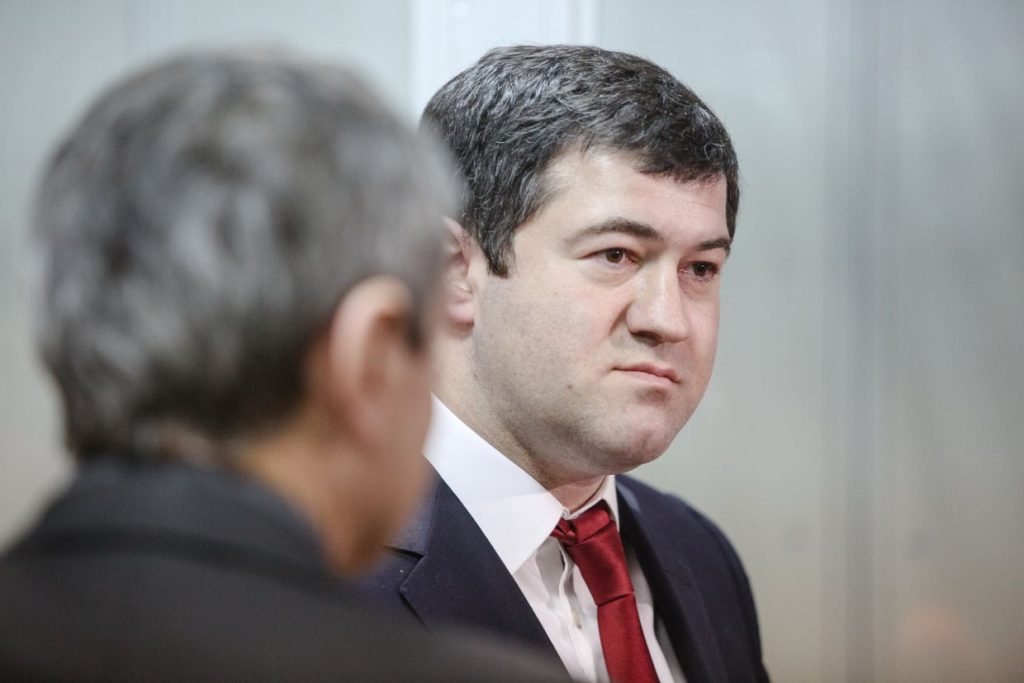The National Anti-Corruption Bureau of Ukraine (NABU) exposed a criminal scheme to launder 21 million euros allegedly received as a bribe by Roman Nasirov, then head of the State Fiscal Service, in 2015-2016. Nasirov’s associate and advisor were charged in the money laundering case. Oleksandr Hlimbovskyi, Nasirov’s associate and owner of Altis, a Ukrainian construction group, helped transfer part of the bribe to accounts in the British Virgin Islands. The entire amount of the bribe was allegedly laundered and used to purchase property in Kyiv. Ukrainian businessman Oleh Bakhmatyuk was charged with giving the bribe to Nasirov in exchange for illegal value added tax refunds. Nasirov was charged with receiving the bribe and is also on trial in a separate abuse of power case.
The NABU and the Specialized Anti-Corruption Prosecutor’s Office (SAPO) seized 81 properties and over Hr 30 million allegedly acquired with laundered funds. The bribe was transferred to accounts in the British Virgin Islands and laundered by Nasirov’s advisor. Nasirov was charged in another case involving alleged misconduct at gas producer Ukrgazvydobuvannya, causing losses to the state. Nasirov denies all accusations of wrongdoing. The U.S. imposed sanctions on Oleksandr Tupytsky, head of Ukraine’s Constitutional Court, and Andriy Portnov, ex-deputy chief of staff for pro-Kremlin ex-President Viktor Yanukovych, accused of corruption and obstructing reforms. This move was seen as a significant step towards fighting corruption in Ukraine.
The exposure of the money laundering scheme involving Nasirov and his associates sheds light on the pervasive corruption in Ukraine. The involvement of high-ranking officials and businessmen in bribery and fraud reflects the challenges the country faces in tackling corruption. The seizure of properties and funds acquired through illegal means shows the commitment of law enforcement agencies to hold those involved in corruption accountable. Nasirov’s denial of the accusations highlights the complex nature of corruption cases and the challenges of proving guilt in court.
The sanctions imposed by the U.S. on Ukrainian officials accused of corruption signify international support for anti-corruption efforts in Ukraine. By targeting individuals like Tupytsky and Portnov, who are allegedly obstructing reforms and engaging in corrupt practices, the international community is sending a strong message against impunity and malfeasance. Ukraine’s fight against corruption requires not only domestic efforts but also collaboration with international partners to combat transnational financial crimes and hold accountable those involved in corrupt practices. The sanctions serve as a warning to corrupt officials that their actions will have consequences on a global scale.
The case involving Nasirov and the laundering of a 21 million euro bribe highlights the importance of financial transparency and accountability in government institutions. The misuse of public funds for personal gain undermines trust in the government and hampers economic development. By exposing such schemes and prosecuting those involved, Ukraine is taking steps towards achieving greater transparency and integrity in its institutions. The collaboration between the NABU, SAPO, and international partners demonstrates a coordinated effort to tackle corruption at all levels and hold perpetrators accountable.
Supporting independent journalism in Ukraine is crucial in exposing corruption and holding those in power accountable. Investigative reporting plays a vital role in uncovering illicit activities and informing the public about corrupt practices. By joining the fight for transparency and integrity, individuals can contribute to the efforts to combat corruption and promote good governance in Ukraine. The challenges Ukraine faces in fighting corruption require collective action from both domestic and international stakeholders to root out corrupt practices and build a more just and equitable society.


